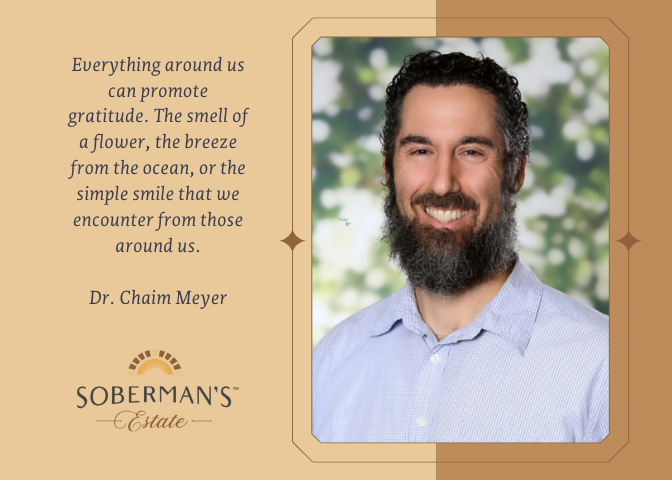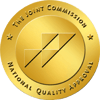In the transformative journey of recovery, one of the most powerful tools you can harness is not just sobriety itself, but the power of gratitude. You might be wondering, 'Why gratitude? What has it got to do with recovery from substance misuse?' The answer is—everything. This simple yet profound emotion has the potential to reshape the way you view your past, perceive your present, and envision your future.
The Importance of Gratitude
Gratitude is about acknowledging the good in life—it allows you to focus on what you have rather than what you lack. It doesn't ignore or gloss over the pain or difficulty you're experiencing. Instead, it enables you to find rays of hope and optimism amidst the storm, making gratitude an essential ally in your recovery and sobriety journey.

The Teaching and Practice of Gratitude in Residential Treatment
At Soberman’s Estate, we understand how powerful embracing gratitude into our lives can be. It has become embedded into our daily curriculum and was the main focus of a workshop that was held last week by Dr. Chaim Meyer, our Spiritual group Facilitator. Dr. Meyer expressed how gratitude can have a profound impact and effect on our lives. Some say that when gratitude is practiced daily, it can have similar effects as medication. Gratitude can produce a feeling of long-lasting happiness and contentment, the physiological basis of which lies at the neurotransmitter level.
When we express gratitude and receive the same, our brain releases dopamine and serotonin, the two crucial neurotransmitters responsible for our emotions, and they make us feel ‘good’. They enhance our mood immediately, making us feel happy from the inside. By consciously practicing gratitude everyday, we can help these neural pathways to strengthen themselves and create a permanent grateful and positive nature within ourselves.
The Power of Gratitude in Recovery
Research suggests that practicing gratitude can have significant benefits on overall well-being and can specifically contribute to the recovery process. Here's how:
- Enhances Positive Emotions: Gratitude shifts your attention from life's adversities to its blessings, allowing you to experience pleasure in the small joys and victories.
- Reduces Stress and Depression: By directing your focus towards beneficial aspects of your life, gratitude can help alleviate feelings of stress and depression, common experiences during recovery.
- Increases Resilience: Gratitude builds emotional resilience, helping you navigate the inevitable setbacks and challenges in the recovery journey.
- Improves Self-Esteem: Practicing gratitude often includes recognizing the value in others and, subsequently, acknowledging your own self-worth.
- Encourages Healthy Relationships: Expressing gratitude can help cultivate and sustain healthy relationships, a vital factor in successful recovery.
How to Cultivate Gratitude in Recovery
Understanding the healing power of gratitude naturally leads to the question, 'How can I bring this into my life?' Here are a few steps to help you embrace gratitude on your recovery journey:
- Keep a Gratitude Journal: Every day, write down three things you're grateful for. They don't have to be big—sometimes, it's the smallest things that make the biggest difference. This practice can help you focus on the positive aspects of your life.
- Express Gratitude to Others: When someone does something kind for you, let them know you appreciate it. It's a simple act that can strengthen your relationships and bring joy to both you and the other person.
- Practice Mindfulness: By focusing on the present moment, you can appreciate your current circumstances rather than dwelling on past regrets or future worries. Mindfulness can be achieved through meditation, yoga, or simply by being attentive to your surroundings. Emily Fletcher, the founder of Ziva, a well known meditation site, mentioned in one of her publications that practicing gratitude is a ‘natural antidepressant’.
- Reframe Your Challenges: Try to view your struggles and challenges as opportunities for growth. This shift in perspective can help you feel more optimistic about your situation and more grateful for your progress.
- Participate in a Gratitude Group or Therapy: Many recovery centers, including ours, offer gratitude-focused therapy or support groups. These can be powerful platforms for cultivating gratitude and connecting with others on a similar journey.
Embracing gratitude can profoundly impact your recovery journey. It's not about denying the reality of your situation—it's about discovering and acknowledging the good within your life, even when facing adversity. Like any aspect of recovery, cultivating gratitude requires practice and patience.
https://www.sobermansestate.com
Soberman's Estate is a residential men's addiction treatment center that provides discreet, individualized, sophisticated recovery and wellness services for adult men that want to recover from substance use disorders, and or other behavioral issues such as trauma, anxiety, depression, stress, or other addictions.





